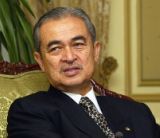Sudan must resolve Darfur crisis to avoid economic sanctions: Malaysian PM
By Salmy Hashim
NEW YORK, Sept 29 (Bernama) — Datuk Seri Abdullah Ahmad Badawi said Sudan must resolve immediately the problem in Darfur to avoid economic sanctions by major powers.
 The Prime Minister said that as chairman of the Organisation of Islamic Conference (OIC) and Non-Aligned Movement (NAM), he had contacted President Omer Hassan Ahmaed El-Bashir of Sudan and explained to him that if economic sanctions were imposed, the people of Sudan would suffer.
The Prime Minister said that as chairman of the Organisation of Islamic Conference (OIC) and Non-Aligned Movement (NAM), he had contacted President Omer Hassan Ahmaed El-Bashir of Sudan and explained to him that if economic sanctions were imposed, the people of Sudan would suffer.
Abdullah, who addressed the United Nations General Assembly on Monday, told Malaysian journalists that economic sanctions would also give room to certain groups to topple El-Bashir’s leadership.
Darfur is hit with a bloody conflict between militias, allegedly supported by the Sudanese government, and the local ethnic population. The conflict displaced some 1.5 million people, turning them into refugees.
Abdullah also discussed the issue in Sudan in his meeting with U.N. Secretary General Kofi Annan here on Monday. They also discussed the Iraqi and Palestinian issues.
On Iraq, Abdullah said OIC and NAM would like the U.N. to play a more bigger role and also to set up a peacekeeping force to bring stability to the gulf state.
However, he said Annan told him that the U.N. was incapable at present to maintain security in Iraq.
Any multinational force led by the United States would be seen by most Iraqis as an invasion force.
On Palestine, Abdullah said he told Annan on the importance of expediting the peace plan known as the Roadmap Quartet because it was the Palestinian issue that had angered Muslims worldwide.
He said Muslims and other developing countries wanted to see an independent and sovereign Palestinian state in 2005 with recognised border and not in conflict with Israel.
The peace plan has been delayed due to the ongoing campaign for the presidential election between George W.Bush and his challenger, Senator John Kerry.
Abdullah also held discussion with President of the 59th United Nations General Assembly, Jean Ping from Gabon. They discussed various issues, including the restructuring of the world body, proposed for the first time more than two decades ago.
The Prime Minister admitted that the restructuring of the U.N. would be very difficult to carry out and would take a long time before it could be accepted especially by the major powers.
However, he said efforts must be made to implement first proposals that were easy to implement followed by proposals that were tough.
The motion to increase the number of permanent members with the veto power in the Security Council would not likely be accepted by existing permanent members, he said.
“They also need to bring the issue to their parliaments before it could be presented to the U.N. Among the issues that need to be discussed is whether the veto power will be given to new permanent members and whether the new members will be alternate members and so forth,” said Abdullah.
The five permanent members with the veto power are the United States, Britain, France, China and Russia.
Among the developing countries that have expressed interest in becoming U.N. permanent members are India, Brazil, Egypt, Nigeria and South Africa. Malaysia also supports Japan and Germany as permanent members.
The Prime Minister also met more than 200 Malaysians, either working at office of the Permanent Representative of Malaysia to the U.N. or with the private sectors as well as students from New York, Boston, Philadelphia, Connecticut and other cities.
